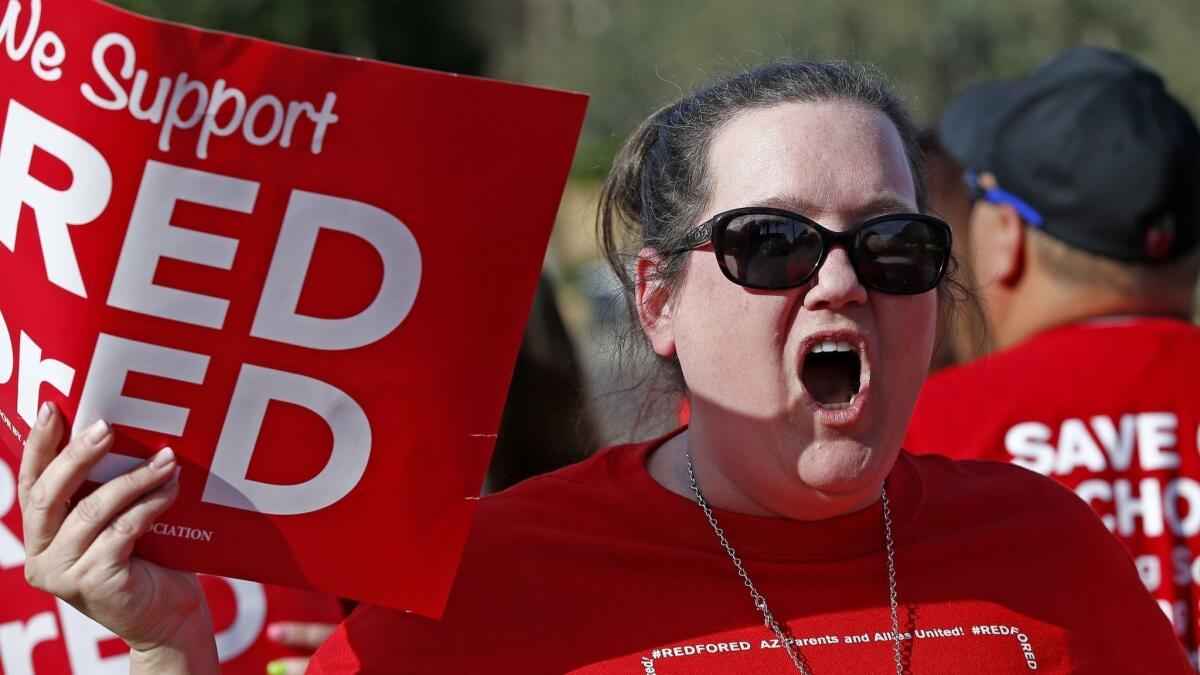Op-Ed: The Arizona teacher walkouts are just a skirmish in the larger war on public education

- Share via
Teachers are walking out again, this time shutting down campuses in 90 or more school districts across Arizona. Gov. Doug Ducey claims to be puzzled: He endorsed a plan to give teachers raises that would add up to a 20% pay increase over the next three years. Why would teachers walk out now?
Surely part of the reason is that teachers in Arizona know a concession on pay isn’t the same thing as a genuine commitment to public education. State leaders like Ducey are so dead set on privatizing education or spending school funds elsewhere that they are ready to change any rules — even longstanding constitutional and democratic norms — to further that agenda.
The biggest norm of all — the very concept that states provide an education to all children — dates back to the 1860s. State leaders then believed that for average people — including African Americans newly freed from slavery — to exercise their rights as citizens, they had to be educated. And unless average people participated in self-government, the country could not live up to its democratic promises. Today, all 50 state constitutions, in one way or another, guarantee access to equal, adequate and stable public education.
Education advocates must start guarding our constitutional and democratic norms in education as jealously as they are guarding teachers’ salaries.
Various constitutional mechanisms ensure states make good on this responsibility. For instance, most require creation of a state board of education, state superintendent or both. Those officials may be elected or appointed, but regardless of the exact process, the goal is to separate education decision-making from everyday politics. In North Carolina, for example, the constitution mandates “a politically and geographically diverse Board comprised of education experts who serve lengthy terms.” The state’s constitutional framers thought this would enable “the Board to place education above politics.”
Many political leaders today, however, don’t want to abide by these norms. Some even question the state’s role in providing public education. If they can change constitutional norms, they can win the larger war over public education while conceding current skirmishes.
Kentucky offers the most recent example. Earlier this month, a statewide teachers strike led the Legislature to increase the education budget over Gov. Matt Bevin’s veto. The loss did not deter Bevin. He just changed strategies. Last week, he had the state superintendent of education, who had more than a year left on his term, removed without cause. His handpicked board of education did the dirty work. The governor’s favored replacement is someone from his own office who could be counted on to promote charter schools.
Other states have done the same. After the 2016 election in which Republicans lost the governor’s mansion in North Carolina, the lame duck Legislature passed a bill to strip the state board of education of its power, transferring the authority to the superintendent’s office, which was won by a Republican. Indiana lawmakers pursued a similar strategy in 2015 when the superintendent’s positions conflicted with then-Gov. Mike Pence.
Courts stand as the final check on these manipulations. Where some are holding strong in important states, lawmakers are looking to amend their constitutions to fix that. The Florida Constitution Revision Commission — a panel stacked by and with Republican lawmakers — has just put an amendment on the November ballot that attacks public education on multiple fronts. It imposes term limits on local school boards and would let the state establish privately run charter schools over the objection of local school boards. Most insidiously, it would replace the requirement that Florida maintain a “uniform” system of free public schools with one that the Legislature provide for the “promotion of civic literacy.”
Similarly, the Kansas Supreme Court repeatedly has found that the state is depriving students of their constitutional rights to education. In partial response in 2015, the state passed legislation to defund the judiciary if it continued to strike down the state laws. The state also stripped the court of its authority to appoint lower court judges. This year, Kansas legislators started calling for a constitutional amendment to deny courts the authority to hear school funding cases at all. The proponents went so far as to hold up the state’s entire public education budget until they got a vote on the proposal. Only a looming deadline ended the standoff.
Arizona is ground zero in a fight to reshape public education led by billionaire industrialist Charles Koch and his network of conservative political donors. Last year, the state passed an expansive voucher bill that gave state subsidies for private school tuition. Now, the Koch network wants more.
At a policy conference in California in January, they announced plans to support a statewide referendum that could shovel even more taxpayer money into private schools. When they offered Gov. Ducey the podium, he was all in. “I didn’t run for governor to play small ball. I think this is an important idea,” he said. Next door, Nevada’s state supreme court recently declared just this type of voucher idea unconstitutional because it put finding priorities for private education ahead of public education.
These tactics reveal that public education is under long-term assault, no matter what short-term concessions are won in Arizona or by other teacher protests. Education advocates must start guarding our constitutional and democratic norms in education as jealously as they are guarding teachers’ salaries. Otherwise, they will wake up one day with nothing left to defend.
Derek W. Black is a professor of law at the University of South Carolina, where his scholarship focuses on education law and policy.
Follow the Opinion section on Twitter @latimesopinionand Facebook
More to Read
A cure for the common opinion
Get thought-provoking perspectives with our weekly newsletter.
You may occasionally receive promotional content from the Los Angeles Times.





